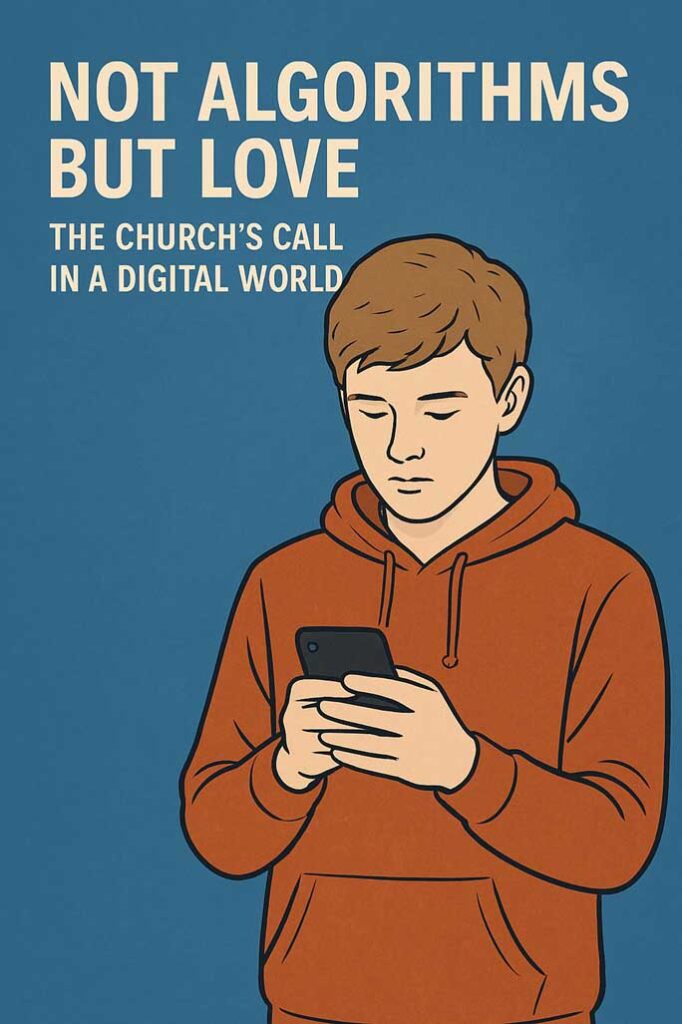

Not Algorithms, But Love: How the Church Can Lead with Aroha in a Digital Age
What does it mean to be the Church when the world is shaped by algorithms, not prayer books? When young people are being discipled more by TikTok than by Sunday school?
After watching the Netflix series Adolescence, I was struck by how real and raw the digital world has become for our young people. It shows us a world where misogyny hides behind emojis, algorithms quietly push extremism, and being online is both a lifeline and a trap. It’s confronting—but also a wake-up call.
So where is the Church in all this? Are we still looking backwards, hoping this digital tide will go out? If so, we’re missing our moment.
Meeting the World As It Is
The Gospel of Luke tells us Jesus grew in wisdom, stature, and favour with God and people. That growth was full—intellectual, physical, spiritual, and social. Today, we’re called to the same kind of wholeness—but in a world transformed by digital technology.
AI isn’t something in the future. It’s here now. Some churches overseas are experimenting with AI-led services, automated sermons, and chatbots for spiritual guidance. These tools can support ministry—but they can’t replace empathy, presence, or love. Used wisely, AI might expand what’s possible, but it should always serve our mission, not shape it.
The Digital World Needs Ethical Guides
Young people today are not just growing up with technology—they’re being shaped by it. Social media platforms, driven by engagement algorithms, often reward outrage, polarisation, and risky behaviours. Adolescence shows how digital culture can deform as much as it informs.
We can’t respond from the sidelines anymore. The Church must become digitally fluent, ethically grounded, and present where young people already are. Digital discipleship isn’t a programme—it’s a posture. Our rangatahi need trusted adults who can walk with them, understand the digital world, and speak with compassion and credibility.
Rethinking Faith and Belonging
Many people, especially younger generations, are not walking away from God—but from rigid versions of faith that no longer speak to them. Instead, they are blending Christian practice with Mātauranga Māori, mindfulness, nature, and justice work. The Spirit is at work in all of it.
This doesn’t mean losing our identity. It means listening deeply. Being open to the Spirit moving in unexpected ways. Embracing expressions of faith that are inclusive, fluid, and grounded in people’s lived experiences.
Living Te Tiriti, Not Just Naming It
Honouring Te Tiriti o Waitangi must go beyond acknowledgements at the start of meetings. It’s about real partnership. True transformation. Weaving Mātauranga Māori into the foundations of our theology, leadership, and worship—not as a side project, but as a core calling.
This invites us to reimagine God not as coloniser, but as Creator-in-relationship—present in whenua, whakapapa, and the breath of the land. A decolonised theology helps us rediscover a gospel that liberates, heals, and connects.
The Church Is Becoming a Movement, Not Just a Building
Church is no longer just what happens in a pew on a Sunday. It’s happening in gardens, Zoom rooms, community centres, and around dinner tables. Our buildings are being reimagined as places of creativity, connection, and care.
And at the heart of it all is awhi—a te ao Māori concept that goes deeper than a hug. It’s about showing up with love, presence, and support in moments of pain, hope, and transformation. It’s what Jesus did over and over—not with dogma, but with compassion. Not with walls, but with welcome.
Call to Action: Awaken, Adapt, Awhi
We are living in a world shaped by digital code—but transformed by human connection.
The Church’s role is not to compete with algorithms. It’s to lead with aroha. To become a community of people who awhi—who hold space for others, who walk with those navigating digital confusion, and who offer hope that is real and rooted.
Let us not retreat from the digital world. Let us step into it—with courage, with clarity, and with a love that doesn’t give up.
This isn’t the end of the Church. It’s the beginning of a new chapter. And the Spirit is already writing it.
